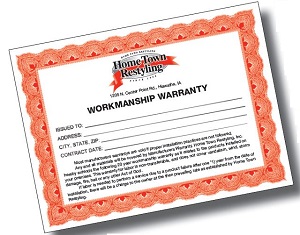When it comes to big-ticket home improvement projects like replacement windows, siding, or appliances, the warranty or guarantee on products or services is critical. Like everything else in home remodeling projects, the devil is in the details. In this post, we’ll go over the basic terminology and concepts you need to know to get the level of protection you need.
First, you should know that there is a federal law that governs most consumer purchases called the Magnuson-Moss Warranty Act. This act governs most consumer purchases in the U.S. of $15 or more and requires that products sold under this statute have either a full or a limited warranty, either written or implied. Every consumer gets this bare minimum protection under the law. There may also be state laws that provide greater protection to consumers.
Most home improvement contractors, retailers and manufacturers go well above the basic requirements established by law to stay competitive. But there is still significant variation in the kind of warranties or guarantees you may be offered and the level of protection they provide.
Guarantee Vs. Warranty
A guarantee is offered at no additional charge while a warranty often costs money and serves as a kind of insurance against failure or defect. With a guarantee, the issuer will make good on products or services within a fixed period of time at no cost to the consumer. A warranty generally only provides repairs during the period it is active, often with many conditions buried in the small print of the contract.
Full Warranty Vs. Limited Warranty
Companies offering a full warranty must repair or replace the product during the specified warranty period. This includes the labor required to fix or replace the defective product. The seller determines the length of the warranty and there is generally a cost associated with this. However, you should be aware that even full warranties do not cover normal wear and tear. Full warranties on products and services are more expensive and somewhat rare these days.
A limited warranty only covers specified parts, services or repairs of particular defects. The items or services that get covered are whatever the seller decides will be covered. For example, limited warranties for replacement windows often have exclusions designed to protect the seller from losses in a broad range of situations. These conditions include, but are not limited to, the following:
- Any condition or failure of performance not primarily AND directly caused by the window manufacturer’s design, materials or manufacture;
- Faulty or improper window installation or installation not in conformity with industry standards or instructions; and
- Failure to maintain windows and frames in accordance with manufacturer care instructions.
These are just a few of the clauses found on many limited warranty contracts. It pays to pay attention to the small print. Once you know the terms, you’ll really want to weigh the costs and benefits before you sign on the dotted line.
Non-prorated Warranties Vs. Prorated Warranties
Whether a warranty is “non-prorated” or “pro-rated” can also cause confusion. A non-prorated warranty protects all aspects of the repair or replacement of a defective product for the duration of the term. This will sometimes also be referred to as a Lifetime Warranty.
With a prorated warranty, homeowners may incur some of the costs of repair or replacement because the manufacturer will only pay for the part or aspect of the product that failed.
Here, especially, is where the devil is in the details. Often, even though the warranty may be labeled as a non-prorated warranty at the top, manufacturers can divide a warranty into non-prorated and prorated terms in the small print.
For instance, a manufacturer may offer a 20-year warranty with the first ten years non-prorated and the last ten years prorated. Depending on the type of product you are buying, this makes sense for the manufacturer because it takes into consideration the increased risk brought on by age. However, for the consumer, the closer you are to the end of the warranty the more likely you are to need it. Either way, you don’t want the terms of the warranty to come as a surprise when you need to use it.
Manufacturer’s Warranty Vs. Workmanship Warranty
Finally, the best manufacturer’s warranty in the world will not protect you from shoddy workmanship or installation mistakes. That’s why you should always get a detailed written proposal from your contractor about the work that will be performed and a written workmanship warranty along with the manufacturer’s product warranty. Hometown Restyling offers a 20-year workmanship warranty.
Home Town Restyling is a full service home improvement contractor with licensed and insured crews on staff for professional installation. If you choose to work with Hometown on projects ranging from window replacement to whole house remodels, you can rest assured that you’ll be working with an experienced team that has served the Cedar Rapids/Iowa City area for nearly 30 years.
Stop by or contact us today for a free estimate. You can also download your FREE Guide, Iowa Contractor Comparison Guide – How to Make Your Remodeling Project a Success for tips on hiring the right local contractor.


